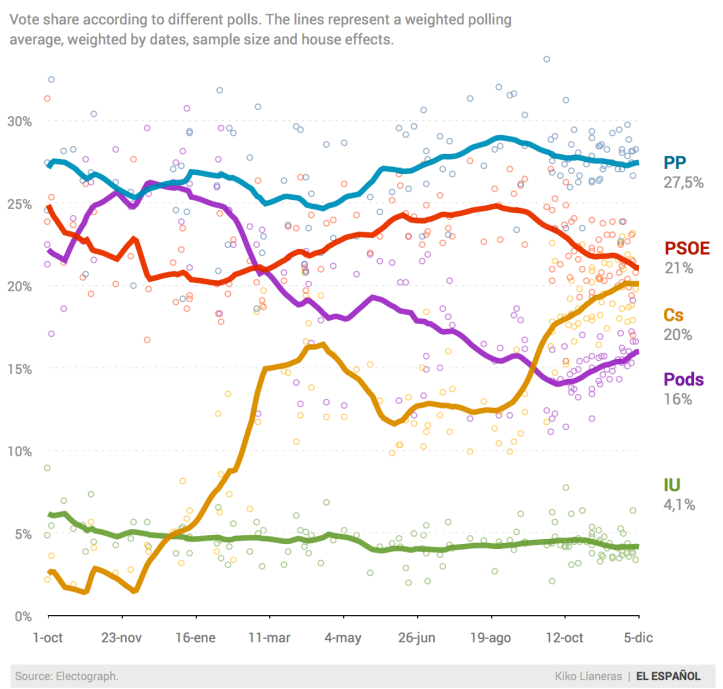 Today, we are voting in a landmark general election in Spain, likely to mark the end of an era of two-party dominance. The conservative People’s party and the Socialists have alternated in power for decades. After years of economic crisis, two upstart parties, the anti-austerity Podemos and the centrist Ciudadanos, expect to capitalize on younger voters eager for change. Polls have been suggesting that the two parties could capture as much as 40% of the vote.
Today, we are voting in a landmark general election in Spain, likely to mark the end of an era of two-party dominance. The conservative People’s party and the Socialists have alternated in power for decades. After years of economic crisis, two upstart parties, the anti-austerity Podemos and the centrist Ciudadanos, expect to capitalize on younger voters eager for change. Polls have been suggesting that the two parties could capture as much as 40% of the vote.
With so much at stake, you would expect a lot of people heading to the polls, after having carefully studied and pondered their available options. Public choice theory tells another story. I think today it’s a good day to recall three papers, where democracy appears in all its beauty, plagued with eerie paradoxes.
In “Cognitive Democracy,” Henry Farrell and Cosma Shalizi argue(1) that democracy is a better way to solve complex social problems than markets or hierarchies. That would be so, even when the individuals behind the democratic process are not necessarily knowledgable.
Jennifer L. Hochschild wonders(2): “If Democracies Need Informed Voters, How Can They Thrive While Expanding Enfranchisement?” She reasons as follows:
Three uncontroversial points sum to a paradox: 1) Almost every democratic theorist or democratic political actor sees an informed electorate as essential to good democratic practice. Citizens need to know who or what they are choosing and why–hence urgent calls for expansive and publicly funded education, and rights to free speech, assembly, press, and movement. 2) In most if not all democratic polities, the proportion of the population granted the suffrage has consistently expanded, and seldom contracted, over the past two centuries. Most observers, and I, agree that expanding enfranchisement makes a state more democratic. 3) Most expansions of the suffrage bring in, on average, people who are less politically informed or less broadly educated than those already eligible to vote.
Putting these three uncontroversial points together leads to the conclusion that as democracies become more democratic, their decision-making processes become of lower quality in terms of cognitive processing of issues and candidate choice. Jennifer admits she cannot genuinely dissolve the paradox: democracy does not, or does not primarily, need cognitively sophisticated citizens; it seems to offers benefits that outweigh the deficits of citizens’ lack of knowledge.
Furthermore, Anthony Downs realized(3) that a cognitively sophisticated voter is but an oxymoron. In a complex society like ours, the cost in time of comparing all the ways in which the policies of competing parties differ is staggering. It is rational to gather additional information only when its marginal return is larger than its marginal cost. The marginal return of information acquired for voting purposes is measured by the expected gain of voting correctly, it is the gain in utility a voter believes he or she will receive supporting the right party. However, unless his or her vote actually decides the election, whether or not the right party wins does not depend on how he or she votes.
This situation shows the insignificance of any voter on a large electorate. The cost of voting is very low–hence millions of citizens can afford to vote–but the probability that any one citizen’s vote is decisive is even lower. It is so negligible that it renders the return from voting correctly infinitesimal.
Therefore we reach the startling conclusion that it is irrational for most citizens to acquire political information for purposes of voting. As long as each person considers the behaviours of others as given, it is simply not worthwhile for him or her to acquire information so as to vote correctly. Hence ignorance of politics is not the result of unpatriotic apathy. It is rational ignorance, a highly rational response to the rules of political life in a large democracy.
Now you know why you could have chosen your vote by flipping a coin… or well, maybe that would be simply rational irrationality(4).
____________________
(1) Farrell, Henry, and Cosma Shalizi. “An Outline of Cognitive Democracy.” Unpublished Paper, 2013.
(2) Hochschild, Jennifer L. “If Democracies Need Informed Voters, How Can They Thrive While Expanding Enfranchisement?” Election Law Journal 9, no. 2 (2010): 111–23.
(3) Downs, Anthony. “An Economic Theory of Political Action in a Democracy.” The Journal of Political Economy, 1957, 135–50.
(4) Caplan, Bryan. The Myth of the Rational Voter: Why Democracies Choose Bad Policies. Princeton University Press, 2011.
Featured Image: Kiko Llaneras, “Who will win the next Spanish elections? A forecast based on polls”
[…] is that more information is always better, unless the cost of search exceed its potential benefit (rational ignorance). Yet people often choose to be ignorant, exhibiting a form of negative […]
[…] I feel my stake in the game ~ 0,00000003 as a huge responsibility resting upon my shoulders. I have to think hard… and if you are Spanish you should […]